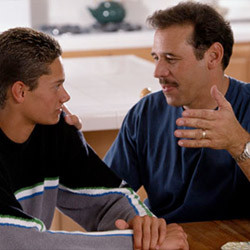 “Spoiling usually results from over-indulging or over-protecting our teen.”
“Spoiling usually results from over-indulging or over-protecting our teen.”How do you know if your teen is spoiled? Certain events can trigger an awareness in us. One mom said she realized her daughter was spoiled the weekend they spent at an out-of-town wedding. Her daughter refused to share a bed with her cousin and insisted upon standing beside her brother for photographs, even though she wasn’t in the wedding party. A dad said he realized his son was spoiled after he picked him up from a two-day camping trip. The boy complained about the habits of his fellow campers and pouted when he heard they were having roast beef instead of their usual Friday night pizza and wings. These wake-up calls tell us it’s time to make changes.
How Do Teens Become Spoiled and What Can You Do?
Spoiling usually results from over-indulging or over-protecting our teen. If that is you, take heart. It’s fixable. It is hardly a crime to try too hard. If your teen was ill for a time, it may have been necessary to take extra care of your teen for a while. The key is to make gradual changes and to always let your teen know what is expected of them. If you change the rules too suddenly or harshly, your teen will be caught off-guard, confused, and may feel humiliated or resentful.
If you suspect that your teen is spoiled, try to identify specific examples. If you’re inclined to, you can also identify some areas in which your teen is expressly not spoiled. This may take a few weeks of observation. What you are likely to find is that your teen is weak in one or two areas. For example, a spoiled teen may:
- Expect you to handle the tedious or unpleasant parts of their life
- Complain frequently if things don’t go exactly the way they want them to
- Expect a lot from you and perhaps from others too
- Seem to think they deserve special treatment
- Want a lot of things and become unpleasant if you don’t deliver them
- Show an unwillingness to do things for themselves, including working
- Not care about the feelings of others
Think about the areas in which your teen needs to improve and tackle one at a time. Chances are, any changes you make will help with other areas as well. You will be more motivated to change if you choose something that currently bothers either you or another family member. That way, more than one person will benefit. In many cases, the change means simply doing less. Not buying them what they want. Not doing their laundry. Not doing things for them that they can do for themselves.
When your teen objects, simply smile and say, “I know you don’t like it. But we all have to deal with these things.” Ignore any tantrum-like behavior, including the silent treatment. Your teen needs you more than you realize, so tantrums are necessarily finite (plus they take a lot of energy).
Teaching Your Teen to Respect Others’ Feelings
If you want your teen to show more respect for your feelings, be a role model. Think about how you respond to your teen, your other children, and your spouse. If you sound respectful, it is reasonable to insist that your teen treat you the same way. If you think that you could both improve, make it a point to be more courteous. Your teen is likely to catch on.
Sometimes teens who have been through a deep depression become accustomed to having their feelings looked after. Family members, the therapist, and even teachers may have gone out of their way to accommodate the teen’s feelings. It may simply be that, in their misery, your teen forgot that others have feelings too. Do not let them get away with mistreating you or your spouse or a sibling because they are going through a rough time. It is okay to say, “We care about your feelings, and we expect you to care about ours.”
Helping Teens Who Lack Empathy
If your teen’s problem goes beyond being discourteous, and they truly seem to lack empathy, you have a more serious issue. Lack of empathy will be a problem for your teen as they enter adulthood. Talk to your teen’s therapist and let her know that you want to help with this issue. Ask her what you can do to help at home. Be a role model for empathy. Let your conversation be peppered with comments like:
- I’m going to take Mrs. Beale to the doctor. She’s too sick to drive.
- Let’s keep our voices down because Dad worked all night and needs to sleep.
- I think you may have hurt your sister’s feelings. Apologizing would make her feel better and it would show your maturity.
- Tell me what you’re feeling, and I’ll try to help.
If your teen has never been very empathetic, it may help to explain that all humans need other people. People who lack empathy do not understand this implicit principle of nature. Explain that when they do something kind, it is a type of insurance that it will come back to them.
 “It is common for siblings to blame themselves for causing the problem.”
“It is common for siblings to blame themselves for causing the problem.”